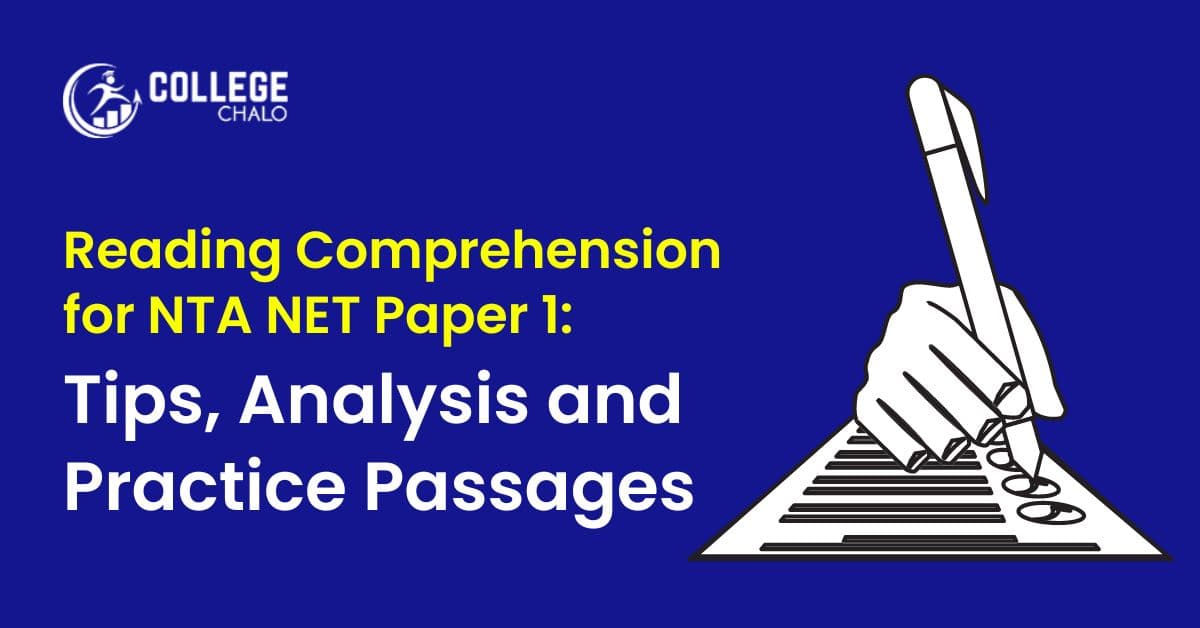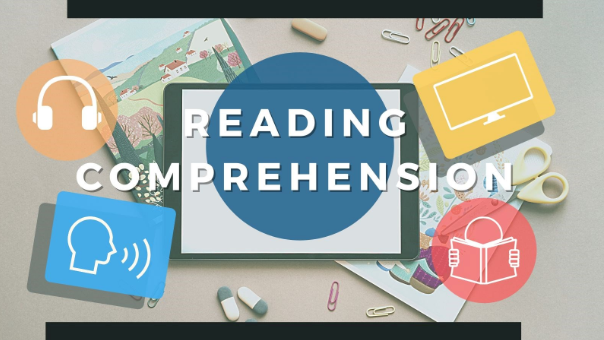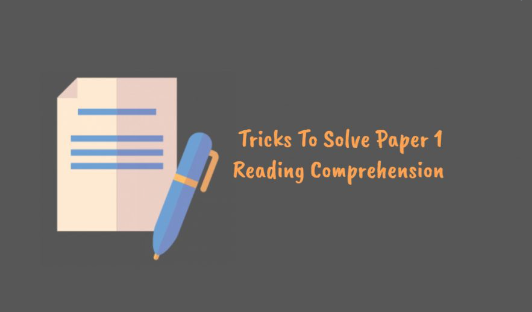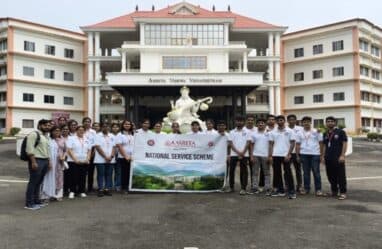Reading Comprehension for NTA NET Paper 1: Tips, Analysis, and Practice Passages

Reading comprehension NTA NET Exam Paper 1 is a vital component, demanding a strong grasp of written passages and the ability to extract key information. Mastering this skill is crucial for success in the exam and requires a combination of effective strategies, analytical thinking, and practice.
This article provides valuable insights, tips, and practice passages to help you excel in reading comprehension. By implementing these techniques, analyzing passages critically, and dedicating time to practice, you will enhance your comprehension abilities and approach the NTA NET Exam Paper 1 with confidence. Let’s delve into the tips, analysis techniques, and practice passages to sharpen your reading comprehension skills for the exam.


Reading Comprehension for NTA NET Paper 1: Key Analysis and Overview
Overview:
- The reading comprehension section in NTA NET Paper 1 includes 5 passages, with each passage followed by 4 questions.
- Each question carries 2 marks, resulting in a total of 20 marks for the reading comprehension section.
- Scoring at least 33% in this section is necessary to pass the exam.
- The primary objective of the reading comprehension section is to assess candidates’ ability to comprehend and interpret written passages effectively.
- Passages in this section cover various subjects such as current affairs, science, technology, and humanities.
- While multiple-choice questions are common, there may be some short-answer questions as well.
Importance and Preparation:
- The reading comprehension section holds significant importance in NTA NET Paper 1 and requires thorough preparation.
- Candidates should practice active reading techniques, including skimming, scanning, and highlighting key points.
- Developing analytical thinking skills and inference-making abilities is crucial to excelling in this section.
- Regular practice with passages from different subjects and disciplines is recommended.
- Time management is essential to complete the section within the allocated time.
Evolution of Reading Comprehension for NTA NET Paper 1: An Overtime Analysis
Changes in the Comprehension:
- Increased Difficulty: The passages in the reading comprehension section have become more challenging over time. They cover complex topics and have longer lengths, requiring candidates to have a higher level of reading comprehension skills.
- Diverse Topics: The passages now encompass a wider range of subjects, including current affairs, scientific advancements, technological developments, and humanities. This reflects the need to assess candidates’ knowledge and understanding across various domains.
Changes in the Questions:
- Focus on Analysis and Interpretation: The questions have shifted towards requiring candidates to analyze and interpret the given passages. They aim to assess candidates’ ability to think critically, draw logical inferences, and apply their knowledge to real-world scenarios.
- Conceptual Understanding: The emphasis has moved from factual recall to conceptual understanding. Instead of testing rote memorization, the questions now focus on evaluating candidates’ comprehension of underlying concepts, their ability to grasp the main ideas, and their capacity to apply the acquired knowledge.
Reasons for Changes:
- Real-World Relevance: The changes reflect the need to align the NTA NET Paper 1 with real-world scenarios and practical applications. The emphasis on analysis, interpretation, and conceptual understanding ensures that candidates can apply their knowledge effectively in their respective fields.
- Higher-Level Skills: The updated reading comprehension section aims to assess higher-level skills such as critical thinking, problem-solving, and logical reasoning. These skills are essential for academic research, teaching, and professional endeavours.
Impact on Preparation:
- Enhanced Critical Reading Skills: Candidates need to develop advanced critical reading skills to comprehend complex passages and answer questions that require deep analysis and interpretation.
- Conceptual Grasp: Emphasizing conceptual understanding necessitates a thorough understanding of key ideas and the ability to relate them to real-world contexts.
- Application-Oriented Approach: Candidates should focus on applying their knowledge to practical scenarios, rather than relying solely on factual recall.
Also, read Difference between NTA UGC NET and JRF


- Identify the Main Idea:
- Look for the central message or point of the passage, often found in the opening sentences or conclusion.
- Understand the main focus or theme that the author is conveying.
- Determine the Author’s Purpose:
- Recognize why the author wrote the passage: to inform, persuade, entertain, or analyze.
- Consider the tone and language used to convey the author’s intention.
- Locate Supporting Details:
- Pay attention to facts, statistics, examples, or quotations that support the main idea.
- Identify specific information that backs up the author’s claims or arguments.
- Refer Back to the Passage:
- Base your answers on the information provided in the passage, rather than relying on your own knowledge or opinions.
- Double-check the details to ensure accuracy and avoid assumptions.
- Utilize the Process of Elimination:
- If unsure of an answer, eliminate options that are clearly incorrect or do not align with the passage.
- Narrow down your choices to increase the probability of selecting the correct answer.
Additional Tips:
- Read the Questions First:
- Before delving into the passage, read the questions to understand what information you need to focus on.
- This helps you actively search for relevant details while reading the passage.
- Multiple Readings:
- Read the passage more than once for better comprehension.
- Initially, grasp the overall idea and supporting details. Subsequently, concentrate on specific questions and corresponding sections of the passage.
- Take Your Time:
- Avoid rushing through the reading comprehension section.
- Understand the passage and questions thoroughly before answering.
Tricks -Reading Comprehension for NTA NET Paper 1
-
Skimming and Scanning (The Speed Readers):
- Skim the passage quickly to get a general idea of the topic, structure, and main points.
- Scan for specific keywords or phrases related to the questions to locate relevant information.
- Example: When skimming a passage about climate change, quickly identify key terms like “global warming,” “greenhouse gases,” or “rising temperatures.”
-
Active Reading (The Engagers):
- Engage with the passage actively by highlighting or underlining important points, main ideas, and supporting details.
- Take brief notes or make annotations to aid comprehension and recall.
- Example: While reading a passage on a historical event, underline key dates, names of individuals, or significant events mentioned in the text.
-
Prioritization (The Strategists):
- Identify questions that are easier or quicker to answer first to maximize your score and manage time efficiently.
- Skip challenging questions initially and return to them later if time permits.
- Example: Start with questions that ask for direct factual information before moving on to questions requiring deeper analysis or inference.
-
Contextual Clues (The Context Detectives):
- Use context clues within the passage to understand the meaning of unfamiliar words or phrases.
- Pay attention to words or phrases that provide definitions, synonyms, or explanations.
- Example: If you encounter the word “ephemeral” in a sentence like “The beauty of cherry blossoms lies in their ephemeral nature,” you can infer that it means something temporary or short-lived.
-
Elimination Strategy (The Smart Eliminators):
- Eliminate answer choices that are clearly incorrect or do not align with the information provided in the passage.
- Narrow down the options by identifying any contradictions or inconsistencies in the answer choices.
- Example: If the passage explicitly states that “the study was conducted in 2018,” and one answer choice mentions “2017” as the year of the study, you can eliminate it as an incorrect option.
Remember, practice is key to improving your reading comprehension skills. Regularly solve sample passages and analyze your mistakes to identify areas for improvement. By applying these tips and tricks, you can approach the Reading Comprehension section strategically and boost your performance in the NTA NET Paper 1.

Passage 1
The advent of social media has revolutionized the way people communicate and share information. Platforms like Facebook, Twitter, and Instagram have become integral parts of our daily lives, connecting us with friends, family, and even strangers from all over the world. However, the rise of social media has also raised concerns about privacy, mental health, and the spread of misinformation. It is crucial to approach social media usage with a critical mindset and establish healthy boundaries to ensure a positive online experience.

Artificial intelligence (AI) is a rapidly advancing field that has the potential to transform various industries. From self-driving cars to personalized recommendations on streaming platforms, AI algorithms are becoming increasingly sophisticated. While AI offers numerous benefits, such as improved efficiency and convenience, it also poses ethical challenges. Questions regarding data privacy, job displacement, and algorithmic bias need to be carefully addressed to ensure responsible AI implementation and safeguard human interests.
Questions:
- What are some concerns associated with the rise of social media? a) Increased opportunities for face-to-face interactions b) Improved mental health and well-being c) Privacy issues and spread of misinformation d) Decreased social connections
- How can individuals ensure a positive online experience with social media? a) By sharing personal information openly b) By spending excessive time on social media platforms c) By approaching social media usage critically and setting boundaries d) By trusting all information shared on social media without verification
- What potential benefits does artificial intelligence offer? a) Increased job opportunities in various industries b) Enhanced human creativity and imagination c) Improved efficiency and convenience in different domains d) Elimination of the need for human intervention in the decision-making
- What ethical challenges are associated with artificial intelligence? a) Concerns regarding energy consumption b) Issues of algorithmic bias and data privacy c) Limited potential for innovation and technological advancement d) Decreased reliance on AI in industries and daily life
- Why is it important to address ethical challenges in AI implementation? a) To limit technological advancements and innovation b) To ensure the complete eradication of AI algorithms c) To safeguard human interests and prevent job displacement d) To eliminate any potential benefits offered by artificial intelligence
Answers:
- c) Privacy issues and the spread of misinformation
- c) By approaching social media usage critically and setting boundaries
- c) Improved efficiency and convenience in different domains
- b) Issues of algorithmic bias and data privacy
- c) To safeguard human interests and prevent job displacement
Passage 2
Climate change is a global issue that demands immediate attention. Rising global temperatures, melting ice caps, and extreme weather events are clear indications of the impact of human activities on the environment. It is essential to address this challenge collectively and take proactive measures to mitigate climate change. Sustainable practices, such as transitioning to renewable energy sources and adopting eco-friendly lifestyles, can play a significant role in combating climate change and preserving the planet for future generations.

Education has a vital role to play in tackling climate change. By raising awareness, promoting environmental literacy, and fostering a sense of responsibility towards the environment, education can empower individuals to make informed decisions and take sustainable actions. Integrating climate change education into school curricula, organizing awareness campaigns, and providing resources for environmental research are crucial steps to ensure that future generations are equipped with the knowledge and skills needed to address this pressing issue effectively.
Questions:
- What are some observable effects of climate change mentioned in the passage? a) Decreased global temperatures b) Increased ice formation in polar regions c) Melting ice caps and extreme weather events d) Decline in greenhouse gas emissions
- How can sustainable practices contribute to mitigating climate change? a) By promoting increased energy consumption b) By relying solely on non-renewable energy sources c) By adopting eco-friendly lifestyles and renewable energy sources d) By ignoring the need for collective action
- What role can education play in addressing climate change? a) Encouraging unsustainable consumption patterns b) Discouraging environmental awareness and responsibility c) Empowering individuals with knowledge and promoting sustainable actions d) Disregarding the need for integrating climate change education into school curricula
- How can climate change education be promoted in schools? a) By excluding it from the curriculum b) By organizing awareness campaigns and providing research resources c) By limiting access to information about climate change d) By discouraging students from engaging in environmental research
- Why is it important to equip future generations with knowledge about climate change? a) To disregard the impact of human activities on the environment b) To encourage unsustainable practices and increase greenhouse gas emissions c) To empower individuals to make informed decisions and take sustainable actions d) To limit the responsibility of future generations in addressing climate change
Answers:
- c) Melting ice caps and extreme weather events
- c) By adopting eco-friendly lifestyles and renewable energy sources
- c) Empowering individuals with knowledge and promoting sustainable actions
- b) By organizing awareness campaigns and providing research resources
- c) To empower individuals to make informed decisions and take sustainable action
CONCLUSION
In conclusion, mastering reading comprehension is crucial for success in the NTA NET Paper 1. By following the provided tips, analyzing passages effectively, and engaging in regular practice, candidates can enhance their comprehension skills and improve their performance in this section. Understanding the main idea, author’s purpose, and supporting details, as well as utilizing a process of elimination, are valuable strategies for approaching reading comprehension questions. Additionally, pre-reading strategies, multiple readings, time management, and active engagement with the passage are key elements to consider. With consistent practice and a systematic approach, candidates can develop the ability to comprehend and interpret written passages more effectively, enabling them to excel in the reading comprehension section of the NTA NET Paper 1.






